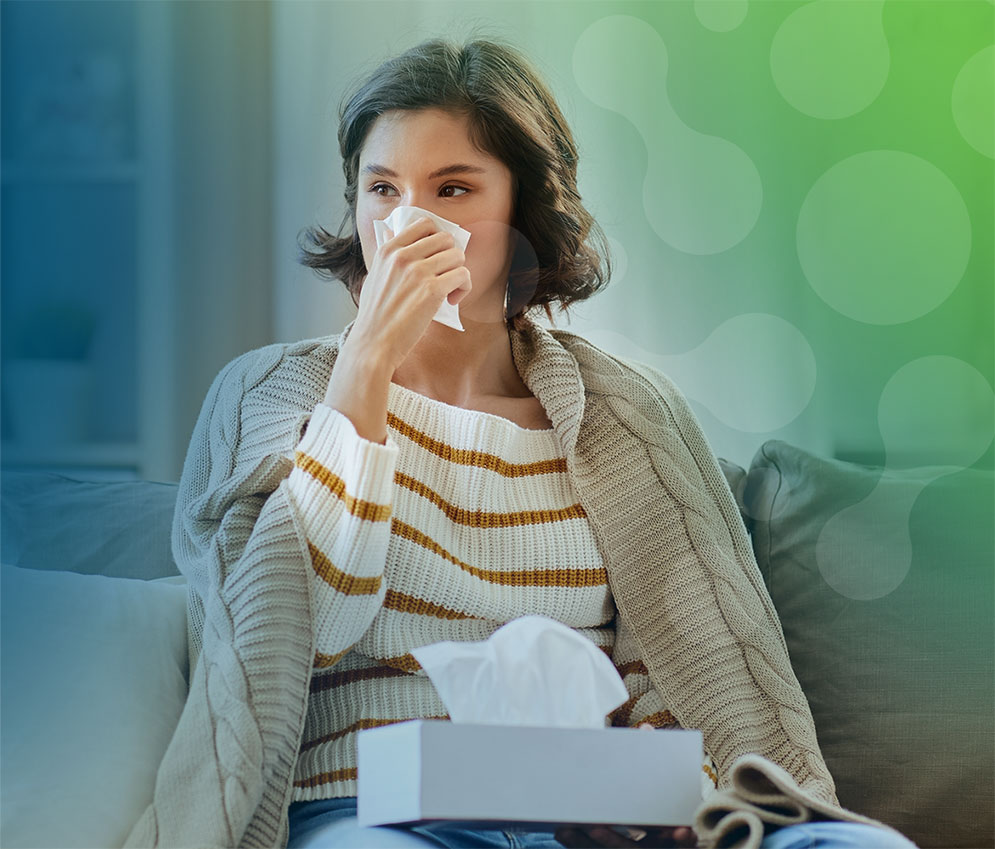Allergies or COVID-19? Determining the Cause of Your Springtime Sneeze
Does wind blowing through the trees make you sneeze? Do you dread the change in seasons because of the miserable symptoms that come with plant and tree pollens? Well, you’re not alone! About 25% of the US population suffers from seasonal allergic rhinitis, commonly known as hay fever. Allergies occur when your immune system overreacts to common materials in your environment, such as pollen, mold spores and animal dander. Allergic rhinitis occurs when a person inhales these allergens. Asthma is commonly associated with allergies as more than half of people living with asthma also have allergies.
Hay fever frequently comes with intense symptoms year-round, including winter. Unlike a cold, which lasts about ten days, seasonal allergic rhinitis symptoms can persist for as long as the allergen is present in the air. For example, cedar fever season peaks from mid-December to mid-February, while grass pollen allergies pop up in the spring and early summer.
If you suffer from seasonal allergies, an allergist can perform simple skin and blood tests to determine graded intolerance and sensitivity to various allergens and create a treatment plan designed to reduce your symptoms. This might include elixers, eye drops, nasal sprays, oral antihistamines, leukotriene modifiers and immunotherapy injections. If you have co-existing asthma, therapy with inhaled medications and treatment to block immunoglobulins may be chosen. This could help you avoid more serious health problems like sinus and ear infections, worsening asthma or bronchitis that could become chronic.
Spring this year comes with the complication of new COVID-19 variants and symptoms that may be confused with allergic rhinitis. Classic hay fever symptoms include a runny nose, itchy or watery eyes, sneezing, coughing, headache, sinus congestion and body aches. When symptoms occur, you may wonder, do I need a COVID test and antivirals or an allergy test and antihistamines?
The ZOE COVID Symptom Study is an app-based epidemiological research project initiated in the UK to help track the incidence of COVID and its symptoms. There are over 4.8 million individuals contributing data right now. This study identifies frequently reported COVID symptoms, which we can then compare to those of hay fever:
| Symptom | Allergic Rhinitis | COVID |
| Chills | No | Yes |
| Fever | No | Yes |
| Body Aches | Rarely | Yes |
| Nasal Congestion | Yes | Sometimes |
| Runny Nose | Yes | Rarely |
| Sneezing | Yes | Sometimes |
| Itchy or Scratchy Throat | Yes | No |
| Nausea, Vomiting or Diarrhea | No | Sometimes |
Extensive research studies like ZOE are essential to help identify best practices for disease prevention, identification and treatment. While there’s certainly overlap in reported symptoms, the differences in nasal symptoms can be helpful. For example, you likely wouldn’t experience a runny nose with COVID as you would with allergies. It’s important to recognize that COVID is an infection caused by a virus, and allergic rhinitis is a noninfectious immune response to an allergen. When considering this chart, we should also remember that everyone is unique, and their response to an infection or sensitivity to an allergen may differ.
May is National Asthma and Allergy Awareness Month. During this time, we can expect to hear news about awareness programs, diagnostics and treatments for asthma and allergies. At IMA Clinical Research, we conduct research aimed at contributing scientific knowledge to help bring new treatments to patients in need of better results regarding asthma, allergies, COVID and other diseases.
Please join us in this effort by enrolling in one of our ongoing studies today. Check out a sampling of our currently enrolling clinical trials to learn more and get involved.
Author: Dr. Charles Andrews




